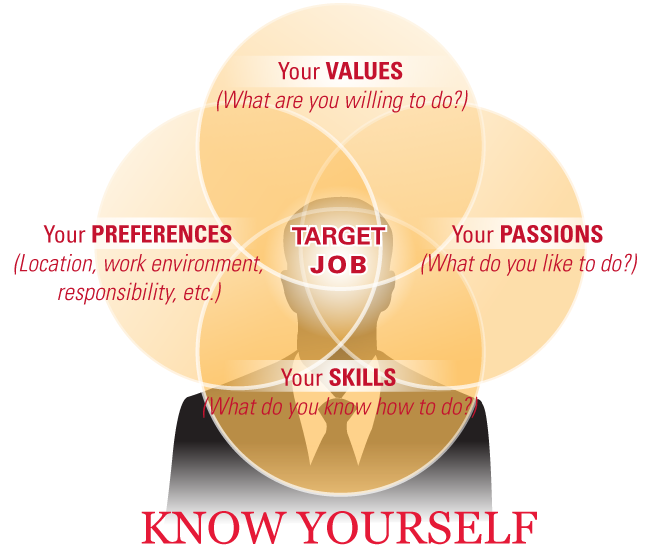You made a great decision to pursue an engineering degree and have a general idea of the work that you want to do. Now is the time to define this a little more with a self-assessment of your career goals and skill set. Career self-assessment is a process through which you reflect on your experiences and your thinking to become aware of your strengths and weaknesses, skills and abilities, interests, values, goals, and aspirations. You may have completed a self-assessment when you were trying to decide on your college major, but the focus now will be on what you want to do with your degree. This Ten-Step Guide is designed for finding employment in industry. If after determining your career goals and graduate school is your destination. We recommend you also read the information on Pursuing Graduate School.
Step 2: Determine Career Goals and Skillset

Completing a self-assessment now is important for a couple of reasons. First, employers are looking to hire people with skills, work values and interests that match the positions they are working to fill, so this will be part of the networking and interviewing processes. Second, it should be your goal to find a job that is in line with your skills, interests, values, etc. so you will enjoy the work and feel good about contributing to the products and services of the employer.
You should perform a self-assessment early in your career at ISU and revisit it occasionally. Don’t be concerned if there is some uncertainty in your self-assessment. Your thoughts will change and become more defined as you complete your coursework, experience new things and learn about potential employers. If you have completed the assessment as part of an internship, you have completed part of a self-assessment.
Self-assessment has several benefits:
- It helps you identify strengths that can be emphasized in interviews, and assess weaknesses that can be downplayed.
- It gives you practice in articulating your achievements, aspirations and goals in a way that connects your experience profile with the strategic needs of the organization with which you’re interviewing.
- It builds your confidence as you become more aware of what you can contribute to an employer. This awareness makes it easier for you to answer interview questions in a way that is natural and forthcoming.
There are many different types and ways of doing a self-assessment but most career related self-assessments focus on some or all of the following:
- Skills
- Values
- Interests
- Geography
- Work Environment
- Responsibility, Stress and Money
- Potential for Advancement/Professional Growth
To help you better understand yourself, complete the Career Goals and Skills Self-Assessment located in Canvas. You want to remain somewhat flexible when you begin the job search, but you need to have a good understanding of yourself and a general sense of what you are looking for in a position. Use the information and your new self-understanding to help guide your job search.
